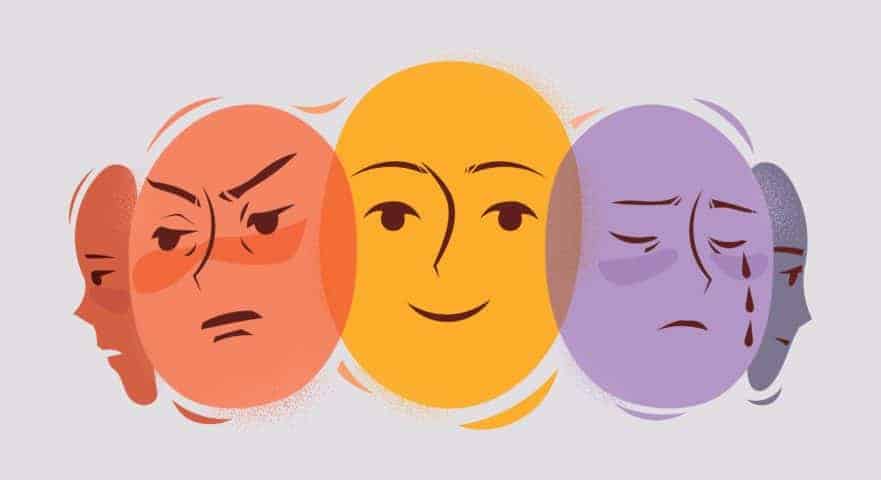If you are wondering how to be less emotional, you might have realized that living at the mercy of intense negative emotions such as anxiety, stress, fear or anger is damaging to your well being as well as your relationships.
By following the steps described below, you will learn how to master your emotions and how to be at peace with them.
How to be less emotional
- Feel your Emotions Fully
To be less controlled by your emotions, feel your emotions more fully as they arise. Create spaciousness for them. With time, the intensity of your emotions will decrease to the point where you can feel all emotions without being overwhelmed by any of them and losing your balance.
- Reducing Emotional Reactivity
To be less emotionally reactive, be aware of your defense mechanism that insidiously and habitually come to your rescue to avoid feeling emotions. Create spaciousness between trigger and your response so you interact with others from a place of centeredness, not overwhelm.
Feel your Emotions Fully
How to be less emotional is a fair question to ask. However, if you want to be less emotional overall and less controlled by your emotions, repressing or denying your emotions just won’t work.
Being able to be at peace with our emotions as they happen is the mark of a healthy balanced individual. It is how you become less emotional overall.
The way out is through. Strong emotions need to be felt fully.
And when they are, they get released.
This is counter-intuitive: to be less emotional, feel all your emotions fully at all times, as they show up. And by your feeling them and acknowledging them, the intensity drops, thereby rendering the emotions harmless to you.
The reason you want to be less emotional is that the intensity of your emotions is so crippling that you want to avoid them. Just like this guy at a party that you run into and can’t stand, when your intense emotions show up, you just want to walk away.
But you’ve tried walking away from your emotions. You’ve tried distracting yourself with TV, food, Instagram and other things. These distractions don’t make the feeling go away or diminish their intensity.
The cycle continues until the emotions has been met with presence and gentleness.
For the feeling to truly be released, it needs to be felt.
It needs to be given attention, just like you would a good old friend that has something important to tell you.
Spiritual therapy is a great solution if you struggle with this – it helps you become aware of your emotions and stay grounded.
Looking For Therapy?
Start Healing Today.
212-960-8626
Reducing Emotional Reactivity
Another reason you might want to be less emotional is to avoid being so reactive to other people.
As children we’ve built defense mechanism around intense emotions to avoid feeling them. It’s so instantaneous and such an automatic part of our psyche that you might not even be aware you are doing it.
Someone says something that hurts your feeling, and you might instinctively crack a joke or be passive-aggressive, even before you realize what it is you are feeling. Your defensive part came to your rescue reflexively.
Reactive emotions are so sticky because they’ve grown into habits.
We are being emotionally reactive when there is no gap between the intense emotions and the instinctive defense mechanism coming to our rescue.
So we don’t ever get to feel how we feel. We are already in the habits of playing defense and avoiding our feelings.
When you feel stress for instance, have you noticed how you feel pulled in different directions? When we feel stress, we are no longer present. We might become irritable or impatient as a reaction to this feeling of being pulled apart.
There is a lack of spaciousness. The heightened emotion of stress is so strong that we react impulsively to anything that shows up. We don’t meet reality where it’s at. We are just playing defense.
If you wish to be less emotional, perhaps you mean that you wish to stop being so emotionally reactive. This is more about creating spaciousness between your trigger and your habitual reaction and less about feeling less.
In fact, the cure to less emotional reactivity is creating space for feeling more. Being present and attentive to your emotions as they arise.
To summarize
- To be less controlled by your emotions, feel your emotions more fully as they arise. Create spaciousness for them. With time, the intensity of your emotions will decrease to the point where you can feel all emotions without being overwhelmed by any of them and losing your balance.
- To be less emotionally reactive, be aware of your defense mechanism that insidiously and habitually come to your rescue to avoid feeling emotions. Create spaciousness between trigger and your response so you interact with others from a place of centeredness, not overwhelm.
Start Your Therapy Today
The therapists at Manhattan Mental Health Counseling are compassionate, skilled, and ready to help you explore the depths of your emotional well-being. We prioritize easy access for our clients and accept a wide range of insurance plans. Can’t make it into our office for in-person appointments? No problem. We are more than happy to provide online sessions in the comfort of your own home. Contact us today by calling 212-960-8626 or by filling out our online contact form.

